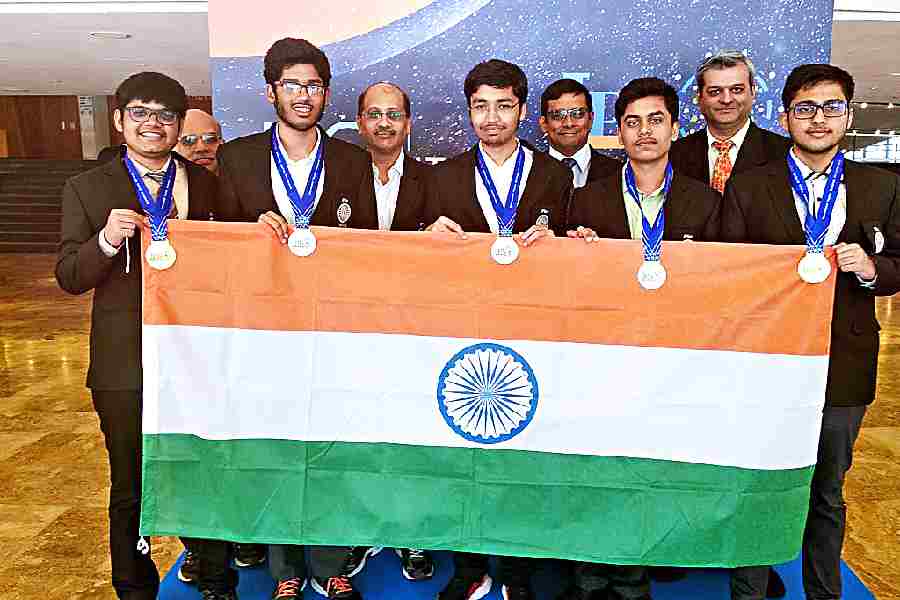Science Challenge


There seems to be no one here who doesn’t know about the Olympic Games. Every four years, the world’s top players gather in one place to showcase their sportsmanship and snatch the title of excellence. Just like that, a friendly competition is held every year for meritorious school students of secondary and higher secondary level from all over the world. It is known as the International Science Olympiad.
Those of you who are studying science must have noticed that it is nothing more than peering into the world of nature around us and analysing it. Just as there is a rich element of excitement in this observation and analysis, there is a wide range of intellectual challenges. The main objective of the International Olympiad is to push talented students into the realm of exciting intellectual challenges of science.
The International Science Olympiad has countries selecting their best students to represent them in the competition. In this context, a national Olympiad programme has been set up in India. This programme is fully funded by the Government of India through the departments of atomic energy, space, science and technology and the ministry of human resource development. The nodal agency for this programme is the Homi Bhabha Centre for Science Education, a wing of Tata Institute of Fundamental Research, in Mumbai. The programme also runs in close collaboration with the Indian Association of Physics Teachers, the Association of Chemistry Teachers and the Association of Teachers in Biological Sciences.
The national Olympiad programme in India follows a five-stage process. The first stage is the National Standard Examinations in physics, astronomy, biology, chemistry and junior science. The syllabus for junior science is equivalent to the secondary school level of CBSE, while for other examinations the syllabus is broadly equivalent to the senior secondary level of CBSE.
The second stage examination is the Indian National Olympiads, which are designed to assess students’ conceptual understanding, logical reasoning, laboratory skills and the ability to apply problem-solving skills to novel situations, theoretical and experimental.
Nearly 500 students for each subject are selected for the Indian National Olympiads according to their performance. To be eligible for stage 2, a candidate must secure a score equal to or greater than minimum admissible score, which is 50 per cent of the average of the top 10 scores in the respective subjects rounded off to the nearest lower integer.
Only 35 students are selected for each subject (50 students in astronomy) to participate in the orientation-cum-selection camp, which is the third stage of the national Olympiad programme. Here, students receive orientation on theoretical, experimental and observational tasks, with an emphasis on developing their conceptual foundations and problem-solving skills. In astronomy, students are trained in basic notions in astrophysics, astronomical data analysis and night sky observations. At the end of the camp, several theoretical, experimental and observational tests are held and, based on their performance in these tests, four to six students are selected per subject to represent India at the international Olympiads.
In the fourth stage of the national Olympiad programme, the selected Indian teams undergo a rigorous training in theory and experiment prior to their departure for the international Olympiads. The third and fourth stages are held at the Homi Bhabha Centre for Science Education in Mumbai, while the final stage is the much-coveted International Olympiad in different countries.
India has been participating in the International Science Olympiad in Physics since 1998 and, in consecutive years, India started participating in chemistry, astronomy, astrophysics, biology and junior science. Starting 2001, the country has also hosted all of these International Olympiads at various different times and India’s strong presence at the Olympiads has been recognised by the international community.
Indian students have excelled at the international Olympiads in every subject since the beginning of participation, with most of the contestants winning medals and laurels at the international competitions in the last 25 years. Many of them have chosen academic careers, and several are now faculty members at reputed universities and research institutions in India as well as abroad, while many more are pursuing research careers in different disciplines of science and engineering.
So, dear students, if you are interested in a little bit of science challenge, get ready to register your name for the National Standard Examinations. You will find the list of registered centres in the website of Indian Association for Physics Teachers (www.iapt.org.in) from the third week of August to the second week of September each year. Surely, it will stimulate your love and enthusiasm for science.